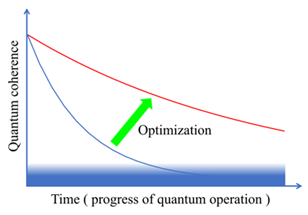DATE2024.05.09 #Press Releases
Developed Compiler Acceleration Technology for Quantum Computers
- Probabilistic method reduces optimal gate sequence search time by orders of magnitude -
Summary of Presentations
The National Institute of Information and Communications Technology (NICT, President: TOKUDA Hideyuki, Ph.D.), RIKEN (President: GONOKAMI Makoto, Ph.D.), Tokyo University of Science (President: Dr. ISHIKAWA Masatoshi), and the University of Tokyo (President: FUJII Teruo, Ph.D.) succeeded in developing a technique to quickly search for the optimal quantum gate sequence for a quantum computer using a probabilistic method.
To make a quantum computer perform a task, it must use a compiler to convert instructions written in a programming language into a sequence of gate operations on quantum bits, or qubits for short. We previously applied optimal control theory (GRAPE algorithm) to an exhaustive search to develop a method to identify the theoretically optimal gate sequence, but as the number of qubits increases, the number of possible combinations increases. As the number increases explosively, an exhaustive search becomes impossible. For example, if we were to perform an exhaustive search to find the optimal gate sequence for the task of generating an arbitrary quantum state of 6 qubits, it would take longer than the age of the universe using the fastest classical computer currently available.
Therefore, we attempted to develop a method to search for the optimal quantum gate sequence using a probabilistic approach and succeeded. Using the supercomputer Fugaku, it was confirmed and demonstrated that using a new probabilistic random search method, it is possible to search for the optimal quantum gate sequence for the above problem in a few hours.
This new method is expected to speed up quantum computer compilers, become a useful tool for practical quantum computers, and lead to improved performance of quantum computer devices. It can also be applied to optimize quantum information processing at quantum relay nodes, so it is expected to contribute to the realization of the quantum Internet and the reduction of environmental impact.
This result was published in the American scientific journal "Physical Review A" on May 6, 2024.

Figure: Improving quantum computer performance (conceptual diagram)
Quantum computer coherence declines over time. If the coherence gets too low, the information in the quantum computer becomes meaningless. By optimizing the operation of quantum computers, more information can be processed before quantum coherence falls below the utility threshold.
Project Professor Kouichi Semba of Institute for Photon Science and Technology participated in the research results.
For more information, please visit the National Institute of Information and Communications Technology (NICT) website.
Links:
RIKEN, Tokyo University of Science. (in Japanese)
Journals
-
Journal name Physical Review A Title of paper


